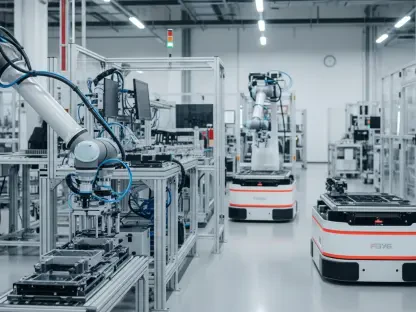Supply Chain Management (SCM) software has become a cornerstone of modern business operations, encompassing everything from procurement to delivery. The ongoing advancements in SCM software promise to revolutionize how businesses operate, improving efficiency and resilience across the board. With a growing focus on integration, automation, and sustainability, these innovations are set to reshape the supply chain landscape.
Core Components of SCM Software
Enterprise Resource Planning (ERP) Systems
ERP systems serve as the backbone of SCM software, automating and integrating essential business processes such as finance and human resources. ERP solutions foster a unified IT ecosystem that enhances coordination across departments. By streamlining workflows and consolidating data, ERP systems pave the way for greater efficiency and more informed decision-making. These systems are crucial for enterprises seeking to synchronize their various operational aspects, including inventory management, procurement, and production planning, within a harmonious framework.
Additionally, today’s ERP solutions are more adaptable and accessible than ever, often delivered via cloud platforms that support real-time data sharing and collaboration. This accessibility ensures that companies can dynamically adapt to changing business conditions and maintain operational continuity. Cloud-based ERP platforms also offer robust disaster recovery features, providing an added layer of security and resilience. In a rapidly evolving business environment, such capabilities are invaluable for companies aiming to sustain smooth operations and achieve long-term success.
Warehouse Management Systems (WMS)
WMS solutions play an essential role in optimizing warehouse operations, focusing on inventory control, picking, packing, and shipping processes. Advanced WMS systems use AI and Machine Learning (ML) algorithms to predict inventory needs, ensuring that warehouses operate efficiently and stock levels remain optimal. These predictive capabilities help prevent stockouts and overstock situations, thereby reducing waste and improving the bottom line for businesses. WMS solutions also often include advanced tools for tracking and managing warehouse activities, ensuring that every aspect of inventory handling is as efficient as possible.
Integration of WMS with other SCM systems, particularly TMS, creates a seamless workflow from order receipt to final delivery. This integrated approach allows businesses to maintain end-to-end transparency and control, significantly reducing errors and delays. The synergy between WMS and other SCM components facilitates streamlined operations, from inward material handling to outward shipping, thereby enhancing overall supply chain efficiency. Companies leveraging such integrated platforms are better positioned to respond to market demand fluctuations quickly and efficiently.
Transportation Management Systems (TMS)
TMS applications oversee logistics, including transportation planning, execution, and optimization. Effective TMS solutions help companies select the best carriers and plan optimal routes, reducing transportation costs and improving delivery times. These systems take into account various factors such as fuel costs, traffic conditions, and delivery windows to ensure that shipments are made in the most efficient manner. The result is not only cost savings but also enhanced customer satisfaction due to timely deliveries.
As global supply chains become more complex, the role of TMS software continues to expand, incorporating advanced analytics and AI to optimize logistical decisions and enhance the agility of supply chain networks. Real-time tracking through Internet of Things (IoT) devices further enhances the effectiveness of TMS solutions by providing accurate, up-to-date information about the location and status of goods in transit. This enables companies to promptly address any issues that may arise, thereby minimizing disruptions and ensuring a smoother supply chain flow.
Evolving Trends and Technologies
Integration and Automation
The convergence of different SCM applications into comprehensive, integrated platforms is a notable trend. These platforms offer significant advantages by bringing diverse data points into a single view, enhancing visibility, and enabling more effective decision-making. Integration breaks down silos within organizations, allowing various departments to work more cohesively and share accurate information in real-time. This holistic approach results in more coherent operational strategies and improved overall efficiency.
Automation technologies, driven by AI and ML, are also becoming integral to SCM systems. These technologies facilitate predictive analytics and demand forecasting, allowing companies to anticipate market shifts and adapt their strategies accordingly. Automation also streamlines repetitive tasks, freeing up human resources for more strategic activities. By reducing the manual workload, automation paves the way for quicker, more accurate processes, which are essential for maintaining a competitive edge in today’s fast-paced business environment.
The Role of AI, ML, and IoT
Artificial Intelligence (AI) and Machine Learning (ML) are revolutionizing SCM software. These technologies enable predictive analytics, helping companies foresee and react to market trends. By leveraging AI and ML, businesses can optimize everything from inventory levels to production schedules, ensuring a more responsive supply chain. These advanced analytical tools provide insights that would be difficult, if not impossible, to achieve through traditional methods, thereby giving companies a significant advantage in planning and operations.
The Internet of Things (IoT) is another transformative technology, providing real-time tracking and monitoring of goods. IoT devices offer unprecedented visibility throughout the supply chain, improving accountability and reducing losses. The combination of AI, ML, and IoT technologies results in more resilient and responsive supply chain networks. This triad of advanced technologies enables greater accuracy in tracking and forecasting, thereby enhancing the reliability and agility of supply chain operations.
Cloud-Based SCM Solutions
Cloud-based SCM solutions are becoming increasingly popular due to their scalability, flexibility, and cost-effectiveness. These solutions facilitate real-time data sharing and collaboration across global supply chain partners, breaking down silos and fostering a cohesive operational environment. The cloud’s inherent scalability means that businesses can easily adjust their operational capacity in response to market demands, without the need for significant upfront investments. This flexibility is particularly beneficial for companies experiencing rapid growth or seasonal fluctuations in demand.
Cloud platforms also support rapid scalability, allowing businesses to expand or contract their operations as needed. Furthermore, cloud-based SCM solutions often come with robust disaster recovery capabilities, helping companies maintain continuity in the face of disruptions. The use of cloud technology ensures that critical data is always accessible and secure, thereby minimizing downtime and operational risks. Companies that adopt cloud-based SCM solutions are better equipped to handle uncertainties and sustain long-term growth.
Addressing Global Challenges and Improving Resilience
Supply Chain Resilience and Risk Mitigation
Recent global challenges have underscored the importance of supply chain resilience. Events like the Microsoft-Crowdstrike computer outage and potential port strikes have highlighted the vulnerabilities within the supply chain sector. Advanced SCM software is crucial for navigating these complexities and mitigating risks. These tools provide the necessary insights and capabilities to identify potential disruptions early and develop contingency plans. By enhancing visibility and control, SCM software enables companies to respond swiftly and effectively to any unforeseen challenges.
The formation of the White House Council on Supply Chain Resilience in 2023 is a testament to the critical role that sophisticated SCM tools play in ensuring robust supply chain operations. This council underscores the need for advanced technologies and robust strategies to enhance supply chain resilience. Companies must invest in resilient SCM software solutions to stay competitive and agile in an ever-changing global environment. Organizations that prioritize resilience are better positioned to withstand shocks and maintain operational continuity, thereby safeguarding their market position and profitability.
Sustainability and Ethical Practices
There is a growing emphasis on sustainability and ethical supply chain practices. Companies are increasingly prioritizing transparency and traceability to comply with environmental regulations and social responsibility standards. Modern SCM software solutions are evolving to include advanced tools for tracking sustainability metrics and managing eco-friendly practices. These features enable companies to monitor and reduce their carbon footprint, ensure ethical sourcing, and promote overall supply chain sustainability. Transparent practices not only build consumer trust but also contribute to a company’s long-term success and reputation.
This trend is driving the development of features that help companies reduce their carbon footprint, ensure ethical sourcing, and enhance overall supply chain sustainability. By aligning SCM practices with sustainability goals, businesses can achieve a competitive edge while contributing to broader environmental and social objectives. Companies that adopt sustainable practices are likely to see benefits in terms of customer loyalty, brand reputation, and regulatory compliance. As the focus on sustainability continues to grow, these practices are expected to become a standard aspect of successful supply chain management.
Strategic Importance of SCM Software Investment
Competitive Advantage and Operational Efficiency
Supply Chain Management (SCM) software has become a vital component of contemporary business operations, covering everything from sourcing and procurement to final delivery. This technology’s ongoing advancements hold the potential to revolutionize how companies function, significantly enhancing efficiency, resilience, and overall performance. Integration is at the heart of these improvements, enabling seamless communication and collaboration among various departments and stakeholders. Automation further streamlines processes by reducing manual tasks and minimizing errors, leading to faster and more reliable operations.
In addition, the growing emphasis on sustainability is pushing SCM software to evolve in ways that promote eco-friendly practices and reduce environmental impact. Companies are increasingly looking for solutions that not only make their supply chains more efficient but also more responsible. These innovations are poised to transform the supply chain landscape, making it more adaptable to the demands of a rapidly changing world.
As businesses continue to prioritize these key areas, the evolution of SCM software will play an increasingly critical role in shaping the future of global commerce, ensuring that supply chains are robust, efficient, and sustainable.









